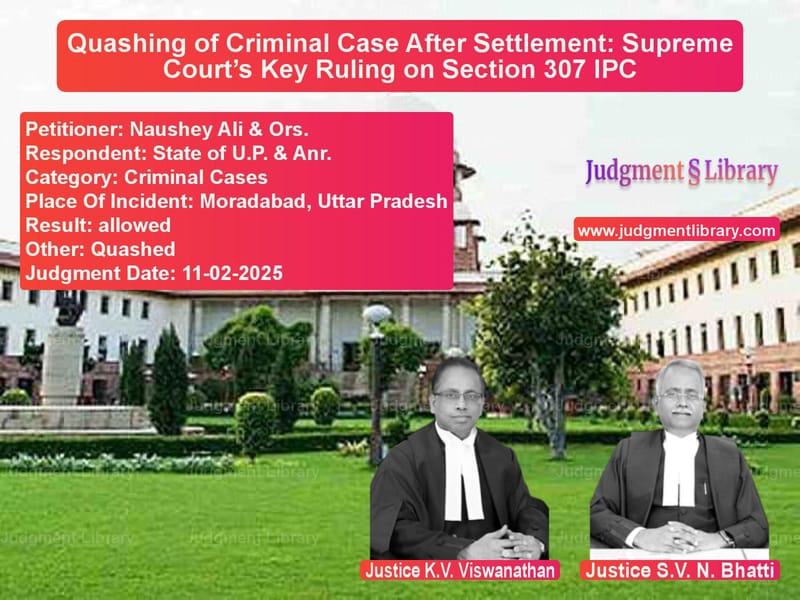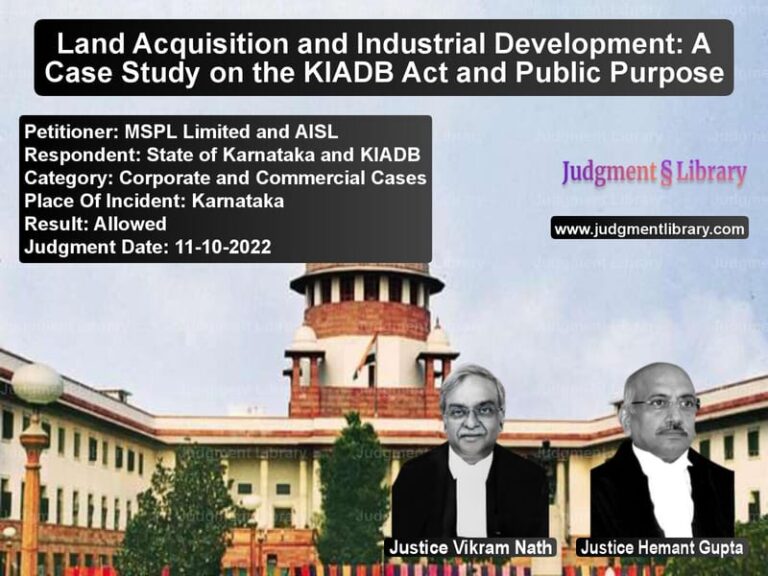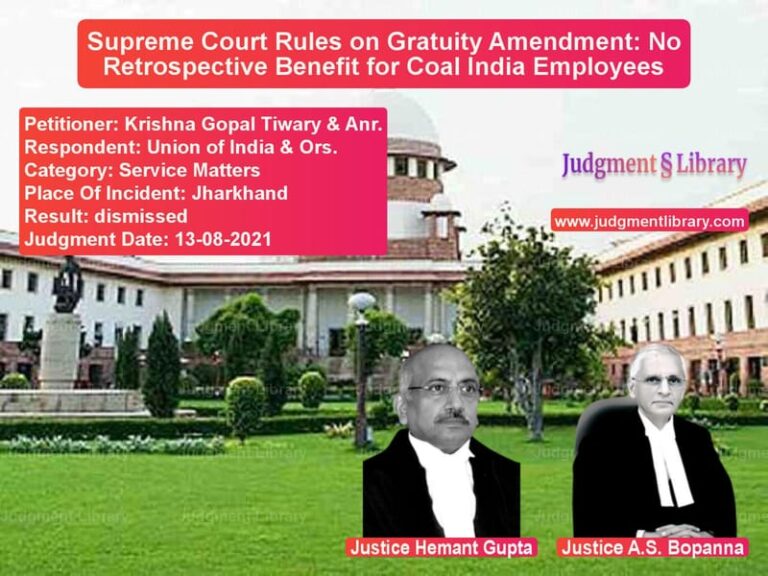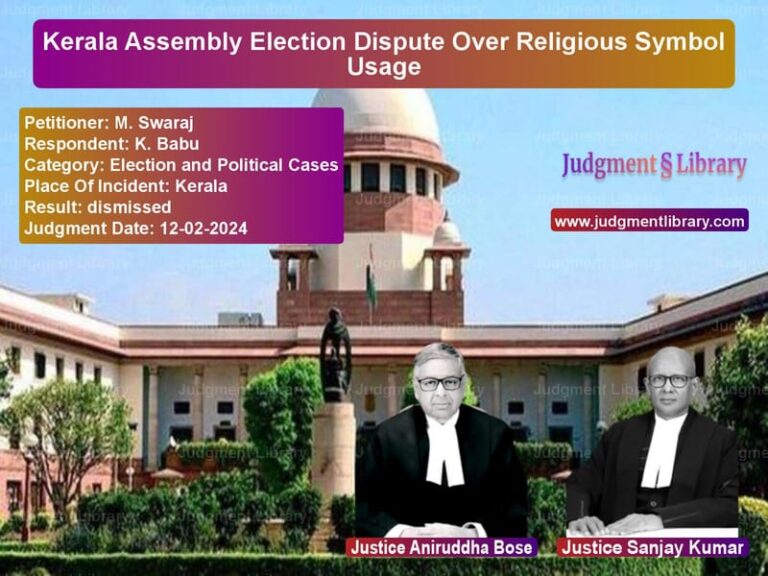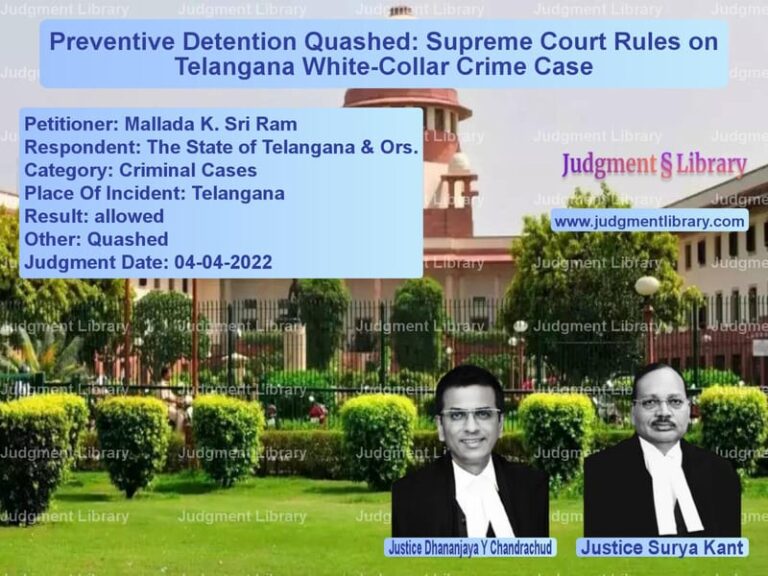Quashing of Criminal Case After Settlement: Supreme Court’s Key Ruling on Section 307 IPC
The Supreme Court of India recently delivered a crucial judgment in the case of Naushey Ali & Ors. vs. State of U.P. & Anr., addressing the issue of whether a criminal case involving an offense under Section 307 IPC (Attempt to Murder) can be quashed based on a settlement between the parties. The case provides valuable insights into the distinction between compounding of offenses and quashing of criminal proceedings under Section 482 CrPC.
The appellants, residents of Moradabad, Uttar Pradesh, were accused in a case arising from a long-standing land and water dispute that led to an altercation in 1991. The case involved cross-FIRs, with both sides alleging serious charges against each other, including offenses under Sections 147, 148, 149, 307, 325, 506, 323, and 504 of IPC. While the police initially closed the case against the appellants in 1991, a magistrate later took cognizance and summoned them for trial. After more than three decades, the parties amicably resolved their differences and filed an application before the High Court seeking to quash the proceedings. However, the High Court rejected the plea, citing the seriousness of the offense.
Background of the Case
The case originated from a dispute over irrigation water on August 11, 1991, between the appellants and the complainant, Mahmood. According to the prosecution:
- The appellants allegedly tried to dig a passage to force water through the complainant’s land.
- When Mahmood objected, the accused used abusive language and physically assaulted him with lathis and iron bars.
- One of the accused, Abdul Waris (now deceased), allegedly fired shots at the complainant.
- The complainant’s party later reached the police station to file a report but found that the appellants had already filed an FIR against them.
On September 7, 1991, after investigation, the police concluded that the case against the appellants was false and filed a final closure report. However, on September 5, 1992, the magistrate rejected the closure report and issued summons, leading to prolonged litigation.
Key Legal Issues
The main question before the Supreme Court was:
- Can an offense under Section 307 IPC (Attempt to Murder) be quashed if the parties have reached a settlement?
- What factors should courts consider while exercising inherent powers under Section 482 CrPC?
- Was the High Court correct in rejecting the plea solely on the ground that Section 307 IPC is a serious offense?
Arguments by the Appellants
The appellants, represented by their counsel, argued:
- The case was a result of a longstanding land dispute between two parties from the same village.
- The police had investigated and closed the case, but the magistrate’s order in 1992 reopened it, leading to unnecessary litigation.
- The parties had amicably settled the matter in December 2022, and continuing the proceedings would serve no purpose.
- The injuries sustained were minor, and the alleged firing did not cause any injury.
- The appellants had already suffered mental and financial hardship for over 33 years.
Arguments by the State
The State of Uttar Pradesh opposed the quashing of proceedings, contending:
- Offenses under Section 307 IPC are serious in nature and cannot be quashed merely because the parties have reached a settlement.
- The complainant suffered a fracture on his left ring finger, which indicated the severity of the assault.
- The High Court was correct in rejecting the application, as allowing such cases to be quashed would set a dangerous precedent.
Supreme Court’s Observations
The Supreme Court carefully examined the facts and legal principles governing the quashing of criminal cases. The Court distinguished between:
- Compounding of offenses (Section 320 CrPC) – where specific offenses can be settled with the permission of the court.
- Quashing of proceedings (Section 482 CrPC) – where the court can intervene if continuing the trial would be an abuse of the legal process.
Verbatim Court Observations
The Court referred to Gian Singh vs. State of Punjab (2012) 10 SCC 303 and held:
“Quashing of offense or criminal proceedings on the ground of settlement between an offender and victim is not the same thing as compounding of offense. They are different and not interchangeable. The power of compounding of offenses is limited, while the High Court has wider discretion to quash proceedings under Section 482 CrPC.”
Read also: https://judgmentlibrary.com/dowry-death-and-acquittal-supreme-court-reverses-husbands-conviction/
Additionally, the Court cited State of M.P. vs. Laxmi Narayan (2019) 5 SCC 688 to clarify:
“Merely because an FIR includes Section 307 IPC does not mean the court must automatically refuse to quash the case. The court must examine the nature of injuries, weapons used, and circumstances of the crime before deciding.”
Final Judgment
The Supreme Court concluded that this was not a case of a heinous crime requiring strict judicial scrutiny. The key reasons for quashing the case were:
- The dispute was of a civil nature (land and water rights), which later escalated.
- The injury sustained by the complainant (fracture of the left ring finger) was not life-threatening.
- There was no medical evidence suggesting any gunshot wound.
- The police initially closed the case in 1991, finding the complaint to be false.
- The case had been pending for over 33 years, and the parties had resolved their differences.
- The complainant himself filed an affidavit in favor of quashing the proceedings.
Based on these findings, the Court allowed the appeal and quashed the pending criminal proceedings against the appellants.
Conclusion
This judgment reaffirms the Supreme Court’s approach that cases involving Section 307 IPC should not be mechanically denied quashing. Courts must assess:
- The nature of injuries and weapons used.
- The background and context of the dispute.
- The possibility of the case being an exaggerated counterblast.
- Whether continuing the proceedings would serve justice.
By allowing the quashing of proceedings, the Supreme Court has reinforced that the criminal justice system should not be used as a tool for prolonged harassment, especially when disputes are settled amicably. This judgment provides relief to individuals trapped in litigation for decades due to personal enmities and misuse of legal provisions.
Petitioner Name: Naushey Ali & Ors..Respondent Name: State of U.P. & Anr..Judgment By: Justice K.V. Viswanathan, Justice S.V. N. Bhatti.Place Of Incident: Moradabad, Uttar Pradesh.Judgment Date: 11-02-2025.
Don’t miss out on the full details! Download the complete judgment in PDF format below and gain valuable insights instantly!
Download Judgment: naushey-ali-&-ors.-vs-state-of-u.p.-&-anr.-supreme-court-of-india-judgment-dated-11-02-2025.pdf
Directly Download Judgment: Directly download this Judgment
See all petitions in Attempt to Murder Cases
See all petitions in Bail and Anticipatory Bail
See all petitions in Judgment by K.V. Viswanathan
See all petitions in Judgment by S.V.N. Bhatti
See all petitions in allowed
See all petitions in Quashed
See all petitions in supreme court of India judgments February 2025
See all petitions in 2025 judgments
See all posts in Criminal Cases Category
See all allowed petitions in Criminal Cases Category
See all Dismissed petitions in Criminal Cases Category
See all partially allowed petitions in Criminal Cases Category

